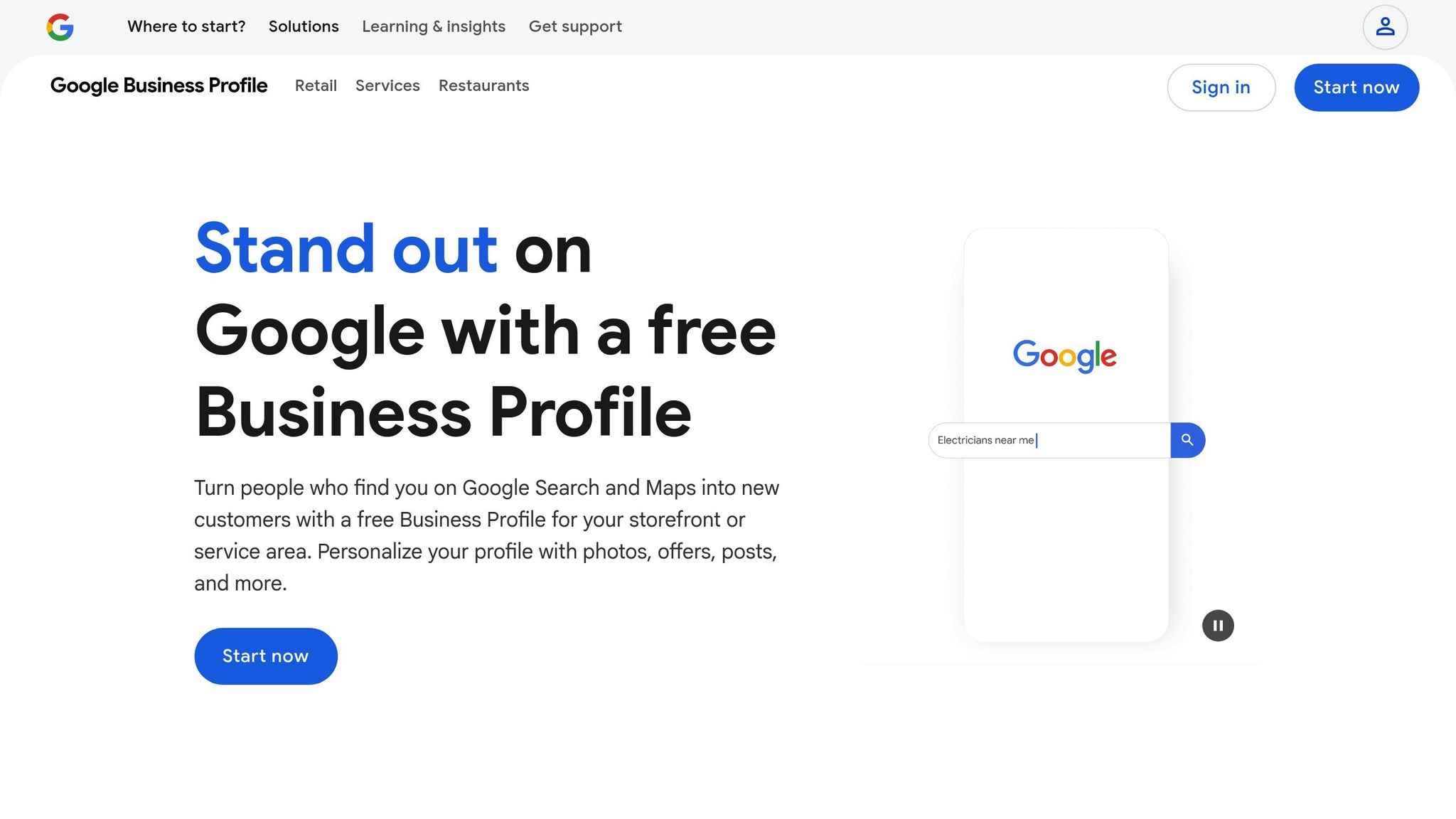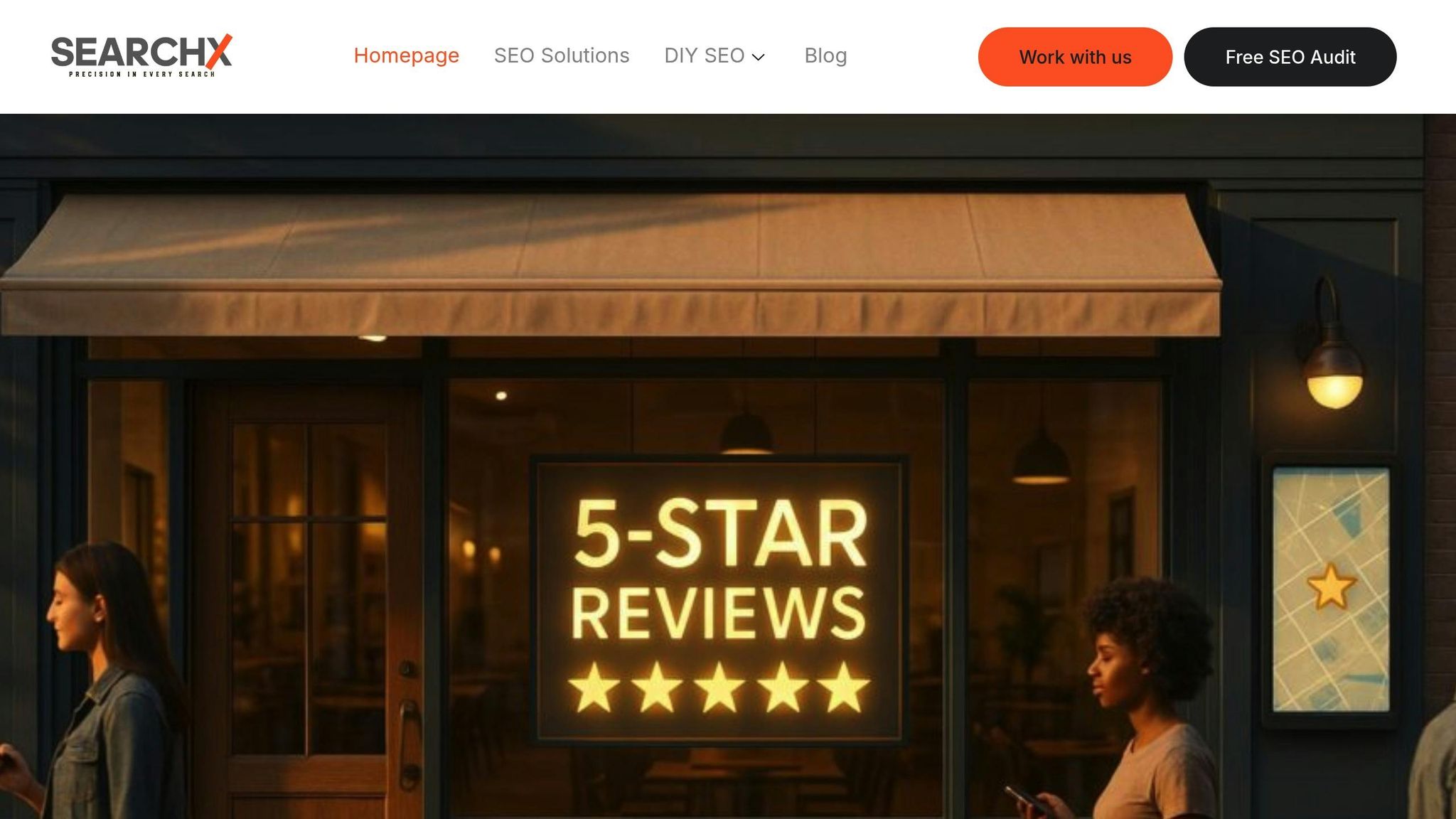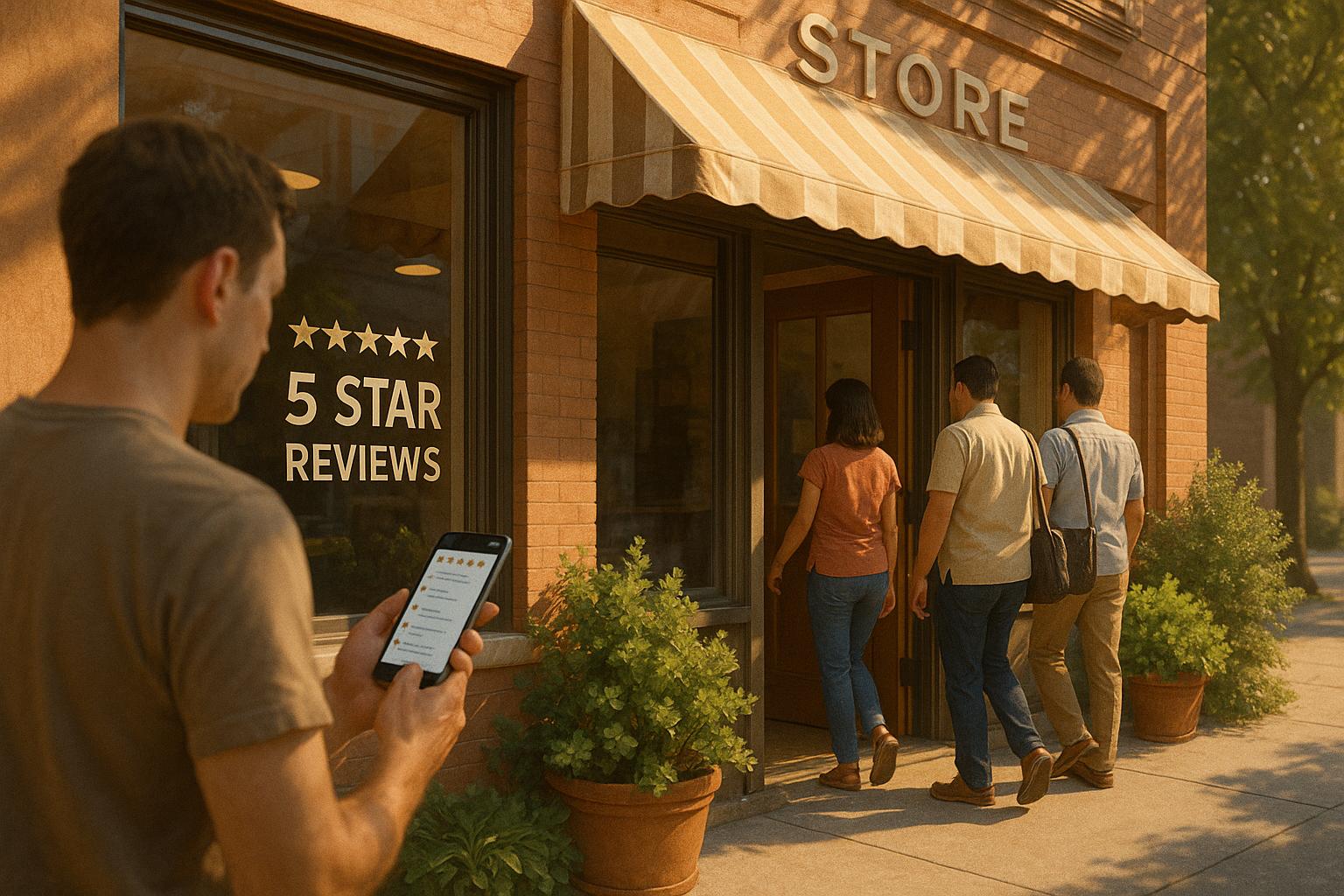Customer reviews are a game-changer for local SEO in South Carolina. They influence search rankings, build trust, and directly impact customer decisions. Here’s why they matter:
- Visibility: Reviews help businesses rank higher in local search results by signaling relevance and trust to search engines.
- Customer Trust: 95% of shoppers read reviews, and 86% rely on them to make decisions. Positive reviews reduce hesitation and boost confidence.
- Platforms: Tools like Google My Business and Yelp amplify your local presence. A complete profile can increase visits by 70%.
- Mobile Impact: 88% of mobile users who search for a business act within 24 hours, making mobile-friendly review profiles essential.
Key Takeaways for South Carolina Businesses:
- Request reviews after positive interactions via email, SMS, or in-person.
- Respond to all reviews promptly – positive or negative – to show attentiveness.
- Use tools like Google My Business and reputation management platforms to monitor and manage feedback efficiently.
How to Get More Google Reviews for your Local Business
How Reviews Impact Local SEO Performance
Customer reviews play a critical role in determining how visible your business is in local search results. Search engines rely on these reviews as ranking signals, and having a strong review profile not only improves your local search rankings but also draws in more potential customers. This connection is built on specific review signals that search engines carefully analyze.
Review Signals in Search Algorithms
Search algorithms focus on several aspects of reviews, including their quantity, quality, recency, and keyword relevance. A high number of well-written, genuine reviews suggests that a business is both active and trustworthy. Additionally, when reviews mention specific services or experiences, they help search engines better understand your business and its relevance to local searches.
Google My Business and Yelp for Local Visibility

Platforms like Google My Business and Yelp rely heavily on these review signals to boost local visibility. For instance, a fully optimized Google My Business profile significantly improves your chances of being found. Considering that 46% of searches are for local information, and a complete profile increases the likelihood of visits by 70%, this platform is a must for local businesses.
Yelp is another major player in local business discovery. Reviews on Yelp influence both search rankings and consumer decisions. A staggering 92% of small and medium business searches result in top-five placements, and 89% of users consult Yelp reviews before deciding where to shop. Notably, Yelp’s audience skews older, with a majority being individuals aged 55 and above.
The Role of Mobile Optimization
Mobile optimization is crucial for local businesses. Studies reveal that 88% of mobile users who search for a business either call or visit within 24 hours. Additionally, 72% of these users visit a store within five miles, and 92% tend to select results from the first page. Ensuring that your review profiles are mobile-friendly is essential for capturing and converting local traffic.
Building Trust and Converting Customers with Reviews
Once you grasp the SEO advantages of positive reviews, it’s time to focus on their ability to establish trust with your customers. Think of customer reviews as the modern version of word-of-mouth recommendations. They don’t just validate your South Carolina business online – they directly influence whether potential customers choose you. Reviews go beyond star ratings; they highlight your business’s dependability and quality, making them a powerful tool for turning curiosity into loyalty.
How Reviews Shape Customer Decisions
Customer reviews play a measurable and impactful role in shaping purchasing decisions. A staggering 95% of shoppers read reviews, and 86% rely on them when making a purchase decision. Moreover, 45% of consumers believe that a higher number of reviews builds trust and reduces the perceived risks of trying out a new business. Data even backs this up, with research showing a strong correlation between authentic feedback and increased trust (β = 0.52, p < 0.05).
Reviews act as social proof. They ease the hesitation many feel when considering a new business by sharing real customer experiences. Whether it’s a mention of a helpful staff member or a detailed description of the service, these reviews help prospective customers decide if your business is the right fit for them. The visual aspect is also crucial – 88% of shoppers rely on customer-shared images when making a purchase decision.
Responding to Reviews Effectively
Collecting reviews is only half the battle; how you respond to them is equally important in building trust and influencing decisions. Responding thoughtfully to feedback – both positive and negative – shows that you value your customers and are committed to their satisfaction.
For positive reviews, take the time to express gratitude and reference specific compliments. This not only shows appreciation but also strengthens relationships with happy customers. Negative reviews, on the other hand, require a careful approach. Address concerns directly, offer solutions, and invite the customer to continue the conversation privately. This demonstrates professionalism and a willingness to make things right.
Adding verified purchase badges to reviews can increase conversion rates by 15%. Encouraging genuine customers to leave reviews on platforms that offer verification features adds an extra layer of credibility to your business profile.
Timing matters too. Responding to reviews within 24–48 hours signals that you’re attentive and prioritize customer feedback. When crafting responses, consider storytelling. Many effective testimonials follow a problem–solution–outcome format, and your replies can mirror this structure. Highlight how you addressed an issue and delivered a positive outcome, reinforcing your dedication to customer care.
Methods for Collecting and Managing Customer Reviews
Gathering and managing customer reviews effectively can do wonders for your business. Not only does it improve your local search rankings, but it also strengthens customer trust and loyalty. For businesses in South Carolina, mastering this process is a key step toward standing out in the local market.
How to Request Reviews from Customers
Getting customer reviews isn’t just about asking – it’s about asking at the right time and in the right way. The best moment to request a review is right after a positive interaction, while the experience is still fresh and the customer’s satisfaction is high.
For many local businesses, in-person requests are highly effective. Train your team to recognize those moments when customers express happiness with your service. A friendly comment like, "We’re so glad you enjoyed your visit! If you have a moment, we’d love it if you could share your experience on Google," can feel personal and genuine.
Email follow-ups are another great option. Within 24–48 hours of a purchase or service, send a short, friendly email thanking the customer and including direct links to your Google My Business profile or other review platforms. Adding a personal touch – like referencing the specific product or service they used – can make the request feel thoughtful.
For quicker responses, SMS campaigns work well. A simple text like, "Thanks for stopping by! We’d love to hear your feedback – click here to leave a review: [link]" is often enough to prompt action.
You can also use review request cards or QR codes. Place them at checkout counters, attach them to receipts, or include them in to-go orders. These are perfect for restaurants and retail businesses, allowing customers to leave a review while their experience is still top of mind.
If appropriate, consider offering incentives for honest reviews, such as discounts or entry into a giveaway. Just make sure to follow the guidelines of the review platform you’re using – most prohibit incentivizing only positive reviews. Be clear that you’re looking for genuine feedback, whether it’s glowing or constructive.
Dealing with Negative Reviews and Spam
Negative reviews are part of doing business, but how you handle them can make a big difference. In fact, 90% of customers say online reviews influence their buying decisions. A thoughtful response to criticism can actually build trust with potential customers.
Start by responding to negative feedback quickly and professionally. Shockingly, about one-third of customer complaints go unanswered. Acknowledge the customer’s concerns without being defensive, thank them for their feedback, and address the specific issue they raised. Avoid excuses or blame – focus on taking responsibility and explaining any steps you’re taking to make things right.
Whenever possible, offer a way for the customer to follow up privately, such as a direct phone number or email. This shows that you’re committed to resolving their issue while keeping the details private. If the problem is resolved, follow up to see if the customer is willing to update their review – or, at the very least, appreciate your efforts.
Some situations may require more formal approaches, like mediation, if direct resolution isn’t possible. Even if the original review remains, how you handle the situation speaks volumes to others reading it.
Spam reviews are another challenge. Look out for reviews that feel generic, irrelevant, or come from suspicious profiles. Most platforms let you report fake reviews, but keep in mind that the removal process can take time.
It’s important to avoid deleting or ignoring legitimate negative reviews. Transparency builds trust, and potential customers often find a mix of reviews more credible than a perfect five-star rating. Having a consistent response strategy – like using templates for common issues but customizing them for each situation – can save time and ensure your replies remain professional.
sbb-itb-880d5b6
Tools and Services for Review Management
Keeping up with reviews across multiple platforms can be a daunting task, especially for busy business owners in South Carolina. The right tools can simplify the process, making it easier to manage customer feedback while boosting your local SEO. Here’s a look at some key tools that can help streamline review management.
Review Monitoring and Management Tools
The Google My Business (GMB) dashboard is a must-have for local businesses. It’s free and gives you direct control over your Google reviews, allowing you to respond to customers and track your listing’s performance. The dashboard sends alerts for new reviews, helping you respond quickly – a crucial step in shaping how potential customers view your business.
If your business is listed on multiple review sites, reputation management platforms can save you time. These tools gather reviews from platforms like Google, Yelp, and Facebook into a single dashboard. Features like review alerts and response scheduling ensure you never miss important feedback. Some even include social media monitoring, capturing mentions on platforms like Facebook, Instagram, and Twitter, with sentiment analysis to flag reviews that need immediate attention.
SearchX Services for Local Review Management

SearchX offers tailored tools to help local businesses in South Carolina manage reviews and improve their local SEO. One standout tool is the Free GMB Audit Tool, which provides an instant analysis of your Google Business Profile. It evaluates factors like review response rates, average ratings, and overall performance, helping you identify opportunities to outshine local competitors in search results.
For business owners who prefer a hands-on approach, SearchX’s DIY Local SEO tools make it easy to collect and respond to customer reviews systematically. These tools are designed to be user-friendly, so you don’t need a technical background to take charge of your local SEO.
SearchX also offers a local listing management service – included in all SEO plans starting at $3,000 per month. This service monitors reviews across more than 50 directories, ensuring your business information stays consistent and you remain responsive to customer feedback across the web – not just on major platforms like Google and Yelp.
Lastly, the Free Website Audit Tool provides a detailed look at your website’s technical and content performance, further supporting your local SEO strategy.
Conclusion: Long-Term Benefits of Review Management
Managing customer reviews isn’t just a box to check – it’s an ongoing effort that pays off over time, especially for businesses in South Carolina. Every positive review adds to your credibility, strengthening your local search visibility. So, when someone in Charleston, Columbia, or Greenville is searching for services, they’re more likely to pick a business with a solid review profile that reflects consistent quality and care. This process not only boosts your online presence but also sharpens your overall business strategy.
Customer feedback is like a roadmap for improvement. Complaints point out areas that need attention, while glowing reviews highlight what’s working. This kind of insight helps businesses stay competitive in their local markets.
The financial impact? It’s more than just better conversion rates. Businesses with strong review management practices often see higher customer retention and even increased transaction values. Positive reviews build trust, which leads to premium service selection, more referrals, and a stronger local SEO presence. Altogether, it’s a win for both your digital marketing and your bottom line.
To make the most of these benefits, you need to adopt some daily habits that keep your review management on track. These practices will help you maintain and grow the momentum you’ve already built.
Key Steps for Continued Review Success
Creating a lasting review management system is all about consistency. Here are a few steps to keep your efforts steady and effective:
- Monitor daily: Check for new reviews on platforms like Google My Business, Yelp, and industry-specific sites. Responding within 24 hours shows customers – and search engines – that your business is attentive and active.
- Automate review requests: Use tools like post-service emails, invoices, or casual in-person asks to encourage reviews without being overbearing. The goal is to make the process feel natural.
- Use review tools: Tools like SearchX’s Free GMB Audit Tool can help you evaluate your review performance against local competitors. This way, you’ll know if your review pace is slowing down or if negative feedback is dragging down your ratings.
- Document your process: Don’t rely on one person to handle everything. Create templates for common responses, set up procedures for serious complaints, and train multiple team members to manage reviews. This ensures consistency, even if someone is unavailable.
- Track your results: Keep an eye on how your review efforts impact key metrics like website traffic, phone inquiries, and customer acquisitions. This data shows the value of your review strategy and helps guide future decisions.
FAQs
What are the best ways for South Carolina businesses to encourage customers to leave positive reviews while following platform rules?
South Carolina businesses looking to boost positive reviews should start by delivering top-notch service and encouraging customers to share their honest opinions. A friendly, professional request can go a long way. Let customers know how their feedback not only supports your business but also helps future customers make informed decisions. Just steer clear of offering incentives or filtering reviews – these actions can break platform rules.
To make the process simple, provide direct links to review platforms like Google Business Profile or Yelp. Train your team to ask for reviews naturally, like after a great transaction or a standout experience. These straightforward and ethical strategies build trust, foster genuine customer connections, and can enhance your local SEO over time.
How can South Carolina businesses handle negative reviews to protect their reputation and local SEO performance?
Managing negative reviews is a key part of protecting your business’s reputation and boosting your local SEO efforts. The first step? Respond promptly and professionally. A quick reply shows customers that you take their concerns seriously. Keep your tone calm and understanding, apologize when appropriate, and aim to resolve the issue privately to avoid further complications.
Another strategy is to encourage happy customers to share their experiences through positive reviews. Consistent positive feedback not only enhances your reputation but also helps build trust with search engines. Finally, make it a habit to regularly monitor your reviews. These insights can guide improvements in your services, setting the stage for long-term growth and success.
How does having mobile-friendly review profiles improve local SEO and customer engagement for businesses in South Carolina?
Why Mobile Optimization Matters for Review Profiles
In South Carolina, where many customers rely on their smartphones to find local businesses, having mobile-friendly review profiles is no longer optional – it’s a must. When your profiles are easy to read and navigate on mobile devices, you make it simpler for customers to engage, leave feedback, and trust your business.
A well-optimized mobile review profile doesn’t just improve user experience – it can also boost your local search presence. For instance, mobile-friendly profiles are more likely to show up in Google’s local pack, increasing your visibility to potential customers. Plus, when leaving a review is quick and hassle-free, people are more inclined to share their experiences, helping you strengthen your online reputation and build trust with future customers.







